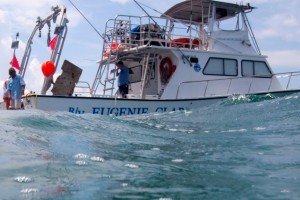
Chemical & Physical Ecology
Studying the impacts of nutrients and physical parameters in riverine, estuarine and coastal environments.
1600 Ken Thompson Parkway
Sarasota, FL 34236
Ph: (941) 388-4441
Hours: 10AM - 5PM
A 501(c)3 nonprofit organization.
 One of the many legacies of Mote’s shark research is that it has been used by the U.S. federal and state governments to regulate and manage shark fishing in our waters.
One of the many legacies of Mote’s shark research is that it has been used by the U.S. federal and state governments to regulate and manage shark fishing in our waters.
As the only congressionally designated center for shark research in the nation, Mote has a special mandate to contribute our expertise to shark management policy. Our current Director Demian Chapman follows in the footsteps of his predecessor Robert Hueter in advising the National Marine Fisheries Service on shark fisheries management.
Since the early-1990s Mote researchers contributed a vast amount of information on subjects ranging from the location of nursery areas to the first estimates of natural mortality of newborn sharks to the key reproductive parameters from a host of species. This all fed directly into assessments of shark populations, which showed populations of many species were overfished in the U.S. Atlantic. This information was the basis for subsequent regulations intended to manage the fishery to recovery.
Today, we continue that legacy in several ways. We monitor shark populations off the Sarasota coast every quarter to determine how the species that live here are doing so that we can report back to government and fishing industry partners about how sharks are doing after more than 20 years of management. So far, the news is good: you can join us in the field to see what this recovery looks like. As shark populations recover we are also sensitive to the fact that people using the ocean are seeing more and more sharks, and in some cases experiencing issues like sharks taking fish from their lines. Our aim is to provide useful information on how people can better share the ocean with sharks. One way we contribute to this is by testing devices intended to repel sharks from caught fish on sharks temporarily housed in our Marine Ecological Research Facility (MERF).